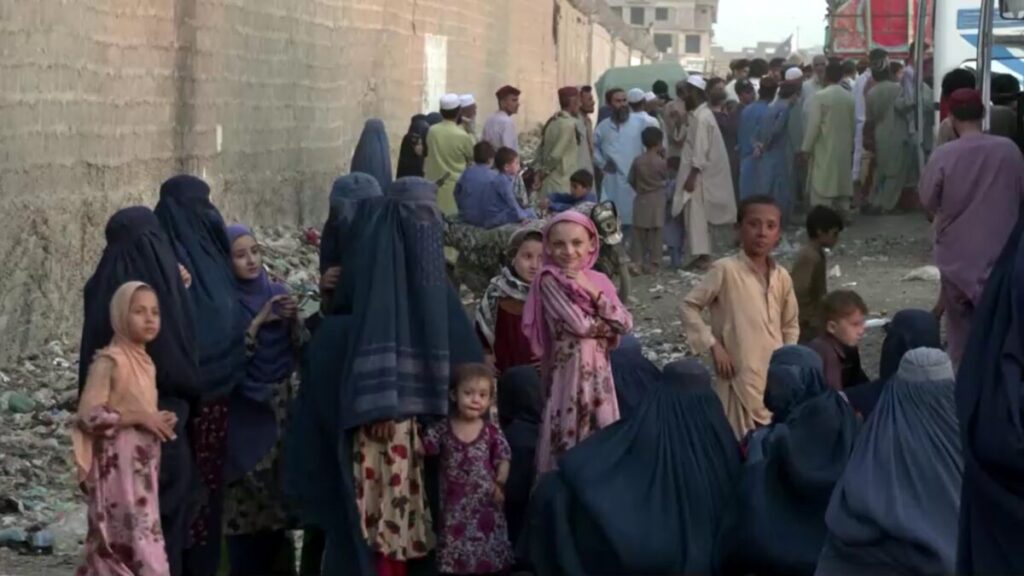As Pakistan’s November 1 deadline for approximately 1.7 million undocumented migrants to leave the country rapidly approaches, Afghan nationals are reluctantly returning to Afghanistan, sparking growing concerns.
The expulsion order has garnered increasing attention and raised apprehensions, as many Afghans, including those who have spent their entire lives in Pakistan, are being compelled to depart due to their lack of Pakistani identity documents.
One such individual, Muhammad Rahim, a 35-year-old Afghan national born in Pakistan and married to a Pakistani woman, expressed his reluctance to leave.
“If the government had not ordered us, I would not have gone there in my entire life because I can neither speak their (Afghan) language nor are we used to living with those people. My entire life has been spent here. I was born here, and my children have grown up here. We know the city of Karachi very well. We don’t want to go back. If we had not been ordered out, we would never leave all our lives,” Rahim said.
Rahim is just one of many Afghans being forced to leave Pakistan due to their lack of Pakistani identity documents.

According to the Taliban government in Afghanistan, between September 23 and October 22, 60,000 Afghans returned from Pakistan after the announcement on October 4 that undocumented migrants who do not leave would be expelled. Recent daily returnee figures have surged to three times higher than normal, as reported by Taliban refugee ministry spokesman Abdul Mutaleb Haqqani on October 26.
The situation has led to a noticeable increase in bus services accommodating the returning Afghans, with Azizullah, a bus service operator near Karachi’s Sohrab Goth area, mentioning that “Before, I used to run one bus a week, now we have four to five a week.”
Pakistan is home to over four million Afghan refugees, according to Islamabad, with Afghans comprising the largest portion of migrants. Many came to Pakistan after the Taliban’s resurgence in Afghanistan in 2021, but a significant number have been present since the 1979 Soviet invasion.
The expulsion threat stems from this year’s suicide bombings, which the government – without providing evidence – attributed to Afghans. Islamabad has also blamed them for other militant attacks and involvement in smuggling activities.
Struggling with inflation and an International Monetary Fund bailout program, Pakistan has cited undocumented migrants as a significant drain on its resources for decades.
For many migrants, Pakistan is the only home they know, providing sanctuary from economic hardship and extreme social conservatism in Afghanistan. Samar Abbas of the Sindh Human Rights Defenders Network, which is assisting 200 Afghans seeking to remain in the country, underscores that despite the challenges, Pakistan is an essential refuge for many Afghans.
Early September saw an average of 300 daily border crossings into Afghanistan, but after the November deadline announcement, this number skyrocketed to roughly 4,000, according to international organizations dealing with migration issues. Pakistan’s Balochistan province, which borders Afghanistan, is opening three more border crossings to accommodate the influx.

Federal Interior Minister Sarfaraz Bugti has announced that law enforcement agencies will commence the removal of “illegal immigrants” starting on November 1. These individuals will be processed at “holding centers” and then deported. Bugti assured that women, children, and the elderly would be treated with respect, although the duration of their detention in these centers remains undisclosed. Pakistani citizens aiding undocumented migrants in obtaining false identities or employment will face legal action, as per Bugti’s statement.
The U.N. refugee agency UNHCR and the International Organization for Migration have expressed concerns about Pakistan’s plans, citing “serious protection risks” for women and girls forced to leave. Restrictive measures, particularly on female non-governmental organization (NGO) workers, have led to reduced employment opportunities for women in Afghanistan.

While Pakistan claims it will not target Afghans with legal status, many with proper documents find themselves in a precarious situation. UNHCR data indicates that as of October 18, 14,700 documented Afghans had left Pakistan, more than double the 6,039 in the previous year. The agency states that 78 percent of returning Afghans cited fear of arrest in Pakistan as the reason for their departure.
Of the more than 2.2 million Afghan migrants in Pakistan with some form of recognized documentation, approximately 1.4 million hold Proof of Registration (PoR) cards that expired on June 30, rendering them vulnerable. Islamabad has assured that it will not take action against individuals with invalid cards, but reports of increased police harassment have surfaced since the expulsion threat, according to Samar Abbas.
In Afghanistan, the influx of returning migrants and refugees has strained already limited resources, compounded by sanctions on its banking sector and reduced foreign aid since the Taliban’s takeover. The Afghan Ministry of Refugees aims to register returnees and provide temporary housing, with the Taliban administration vowing to help them find employment. Afghanistan’s unemployment rate has more than doubled since the Taliban takeover, and U.N. agencies report that around two-thirds of the population requires humanitarian assistance.
Source: Reuters





